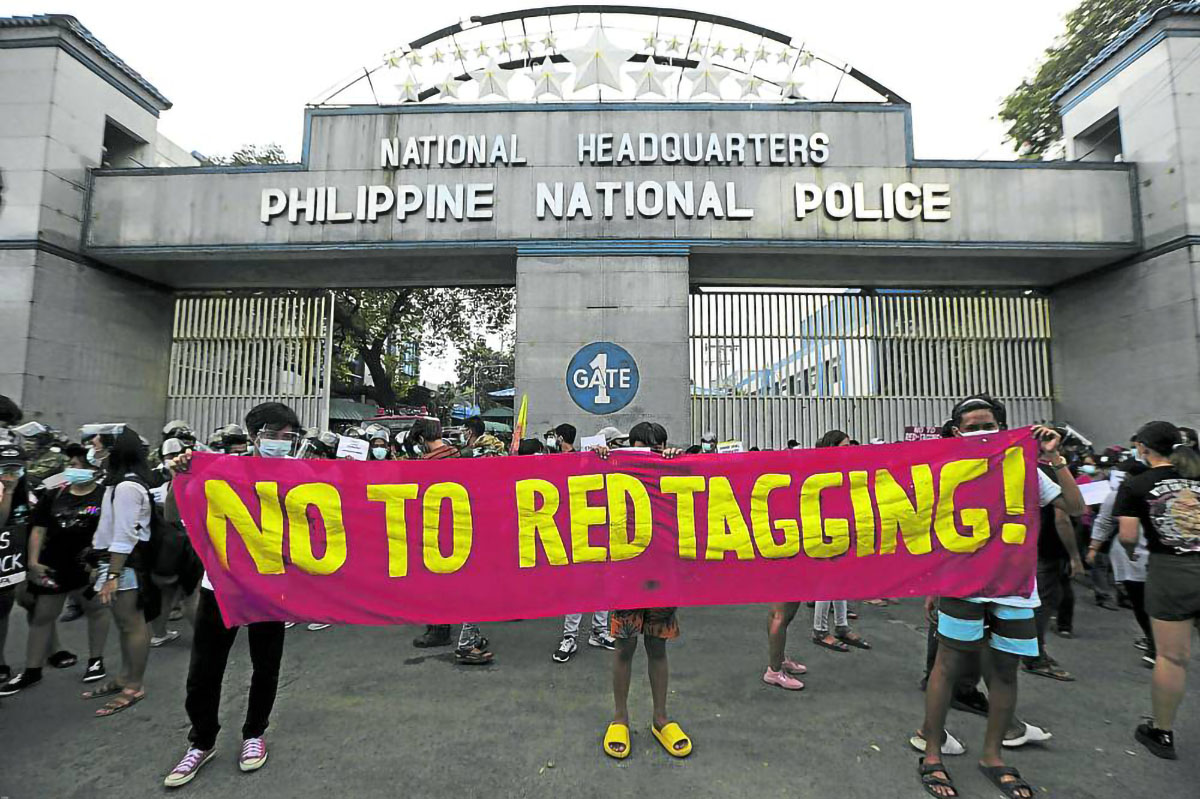
A CHECK ON STATE ACTIONS The Supreme Court ruling penned by Associate Justice Rodil Zalameda on Red-tagging is seen as “fair warning” to Red-taggers in government and a win for activists, including those in this group that staged a protest in front of Camp Crame on Dec. 11, 2020. (File photo by GRIG C. MONTEGRANDE | Philippine Daily Inquirer)
MANILA, Philippines — Red-tagging, or the act of branding activists and critics as communist rebels or sympathizers, is a threat to the life, liberty, and security of the intended victims, the Supreme Court has ruled, dealing a blow to state officials notorious for such a practice and a victory to human rights watchdogs and civil society groups.
In a 39-page full-court decision made public on Wednesday, the high tribunal said Red-tagging, as well as “vilification, labeling, and guilt by association,” could warrant the issuance of a writ of amparo to protect victims’ rights from aggressors.
In the landmark decision written by Associate Justice Rodil Zalameda, the high court said that inherent to the practice of Red-tagging was the “use of threats and intimidation” to discourage “subversive” activities.
READ: Media security chief gets flak for ‘red-tagging’
“Whether such threats ripen into actual abduction or killing of supposed ‘Reds’ is largely uncertain,” the Supreme Court said.
But being associated with communists or terrorists could make a Red-tagged individual a target of vigilantes, paramilitary groups, or even state agents, it said.
“Thus, it is easy to comprehend how a person may, in certain circumstances, develop or harbor fear that being Red-tagged places his or her life or security in peril,” it added.
The ruling was concurred in by 12 other Supreme Court magistrates, except Chief Justice Alexander Gesmundo and Associate Justice Jhosep Lopez, who were both indicated on the document as being on leave.
READ: Pushback against red-tagging
‘A strong slap’
Activist groups and rights organizations hailed it as an important ruling that could serve as the basis for future decisions involving persons unfairly tagged by state authorities as members of communist groups.
The National Union of Peoples’ Lawyers (NUPL) said the Supreme Court’s “long overdue” decision was crucial as it “categorically and unequivocally” stated that Red-tagging was a threat.
“It is not a mere legally meritorious victory nor a vindication and potential shield of human rights defenders and a tribute to those fallen and already victimized by it, but a strong slap on self-righteous Red-taggers before and now,” the NUPL said.
In defining the concept of Red-tagging for the first time, the high tribunal cited the United Nations Human Rights Council’s observance of the prevalence of the practice in the Philippines, where progressive groups were identified as “front organizations of anti-democratic groups.”
It cited the UN High Commissioner for Human Rights report in 2020, which found that labeling groups or persons as “Red” was associated with frequent surveillance and direct harassment, with some receiving death threats via text or online message, or worse, being killed.
“The foregoing accounts of Red-tagging depict it as a likely precursor to abduction or extrajudicial killing… This Court has demonstrated its understanding of this fear,” the high court said.
PH’s McCarthyism
It also took into consideration a separate opinion by Senior Associate Justice Marvic Leonen in the case of Zarate v. Aquino, in which he described the phenomenon of “red-baiting” as the Philippines’ version of McCarthyism, referring to political witch hunts against communists in the United States in the early 1950s.
The high tribunal issued the ruling in response to the petition for review on certiorari filed by Siegfred Deduro, an Iloilo-based activist and former representative of Bayan Muna party list, who brought charges against the military officers who had accused him of being a ranking member of the Communist Party of the Philippines and its armed wing, the New People’s Army.
The officers were under the command of Maj. Gen. Eric Vinoya, the commanding officer of the Philippine Army’s 3rd Infantry Division.
Dismissed by RTC
Deduro filed a petition for a writ of amparo — a legal remedy to any person whose right to life, liberty, or security is violated or threatened by an unlawful act or omission — in the Regional Trial Court (RTC) of Iloilo City to stop Vinoya and his subordinates from harassing him.
The RTC, however, dismissed his petition, as it found that Deduro’s allegations of Red-tagging were “insufficient” to be considered threats to his life.
In overturning that decision, the Supreme Court admonished the lower court for depriving both parties of their right to due process.
“Petitioner should not be expected to await his own abduction, or worse, death, or even that the supposed responsible persons directly admit their role in the threats or violations to his constitutional rights, before the courts can give due course to his petition,” it said.
But the high court clarified that it was not making a categorical ruling on the merits of the case, as it ordered the RTC to call a summary hearing within 10 days.
“This ensures that petitioner’s cause of action and respondent’s defense are fully ventilated because this Court is not a trier of facts,” it said.
Even so, Bayan Muna executive vice president and former Rep. Carlos Zarate said the ruling “will now serve as a fair warning to rabid Red-taggers like [television hosts] Jeffrey Celiz and [Lorraine] Badoy that soon they will be made accountable for their actions.”
Badoy was a former spokesperson of the National Task Force to End Local Communist Armed Conflict or NTF-Elcac, whose members had carved a reputation for Red-tagging.